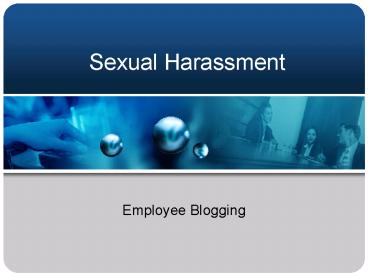Sexual Harassment PowerPoint PPT Presentation
1 / 16
Title: Sexual Harassment
1
Sexual Harassment
- Employee Blogging
2
Members
1. Talisa R. Clark
2. Nik Amin
3. Clotee Harris
3
Types of Harassment
FORMS
Sexual
Racial
Harassment
Religion
Disability
Disability
4
What is Sexual Harassment?
- Unwelcome conduct of a sexual nature in the
workplace. - Unwelcome behavior such as
- Sexual advances
- Requests for sexual favors
- Verbal and physical conduct of a sexual nature
- Display of sexually explicit or suggestive
materials
5
Types of Sexual Harassment
- Quid Pro Quo
- This form of sexual harassment is sometimes
thought of in terms of "something for something"
or "this for that." - Usually occurs within the context of a
supervisor-subordinate relationship. - That is, when submission to or a rejection of
sexual requests or conduct is used as a basis for
employment decisions such as promotion, transfer,
raise, or even continued employment.
6
Types Continued.
- Hostile Work Environments
- May include
- Severe or pervasive conduct
- Unreasonable interference with an individual's
job performance - Offensive, intimidating, or abusive atmosphere
- Can be created by anyone in the workplace
- Employees, such as a supervisor or co-worker.
- Even a client or customer can create a hostile
work environment.
7
RxTRA Issue
- A female accountant, Nina Numbers, filed a Title
VII harassment claim with the Equal Employment
Opportunity Commission, and started her own blog
that detailed her version of the facts. When
RxTRA learned about her blog, it terminated her.
8
Progress Diagram
Sexual Harassment
Laws
Blogging
Employer subjects an employee to unwelcome
verbal, nonverbal, or physical conduct of a
sexual nature that affects the employees
employment, interferes with the employees work
performance, or creates a hostile work environment
Title VII Applies to employers with 15 or more
employees, including state and local governments.
It also applies to employment agencies and to
labor organizations, as well as to the federal
government.
Known as weblog, defined as a shared online diary
or chronology of thoughts
9
Employee Blogging
Guidelines
CONFIDENT
THINK
RESEARCH
POLITE
http//sexualharassmentworkandpersonal.blogspot.co
m/
10
Blogging Issues
Legal Limitations
Employers Response
Legal Issues
Guidelines
at-will presumption 1st Amendment
NLRA National Labor Relations Act
Official Employers Policy Handbook Against
It Encourage It
Think Research Confident Polite
11
Blogging Legal Issues
- At-will employer or employee may terminate the
relationship at any time - For any reason or even for no reason at all!
12
Blogging Legal Issues (Cont.)
- 1st Amendment protects speech from being
censored by the government NOT private parties - Does NOT protect bloggers from what they say!
13
Blogging Legal Limitations
- National Labor Relations Act (NLRA)
- Provides that an employee may not be disciplined
for discussing wages, hours, or other terms and
conditions of employment. - As a result, a blog that encourages other
employees to lodge complaints or that discusses
certain employment policies, such as
compensation, may be protected under the NLRA.
The NLRA protect both unionized and non unionized
employees.
14
Employer Response
Encourage It
Control Blog Site
Terms Conditions
Employer Policy Handbook
Ignore It
Litigation Protection
15
Employers Procedure
- If inappropriate blogging
- Determine whether the blog was created and/or
maintained during company time with the use of
company resources. - If so then employer can discipline employee.
- Posting a blog that could subject an employer to
liability will also provide ample grounds for
employee discipline.
16
Recommendation
- Incorporate Policy
- The dos and don'ts of blogging
- Examples
- 1. Make it clear that the views expressed in the
blog are yours alone and do not necessarily
represent the views of your employer. - 2. Respect the companys confidentiality and
proprietary information. - 3. Ask your manager if you have any questions
about what is appropriate to include in your
blog. - 4. Be respectful to the company, employees,
customers, partners, and competitors. - 5. Understand when the company asks that topics
not be discussed for confidentiality or legal
compliance reasons. - 6. Ensure that your blogging activity does not
interfere with your work - Training
- Sexual Harassment training for new employees.
- Educate on laws, legal issues, and so forth.

